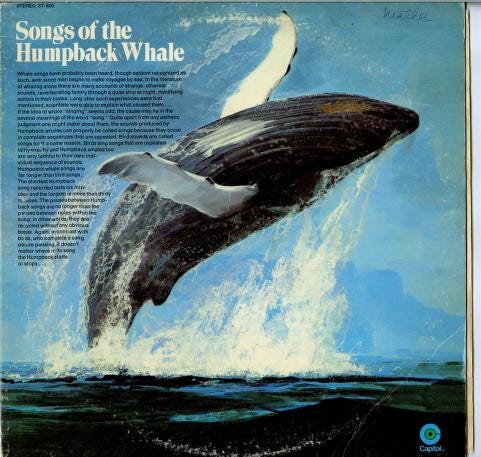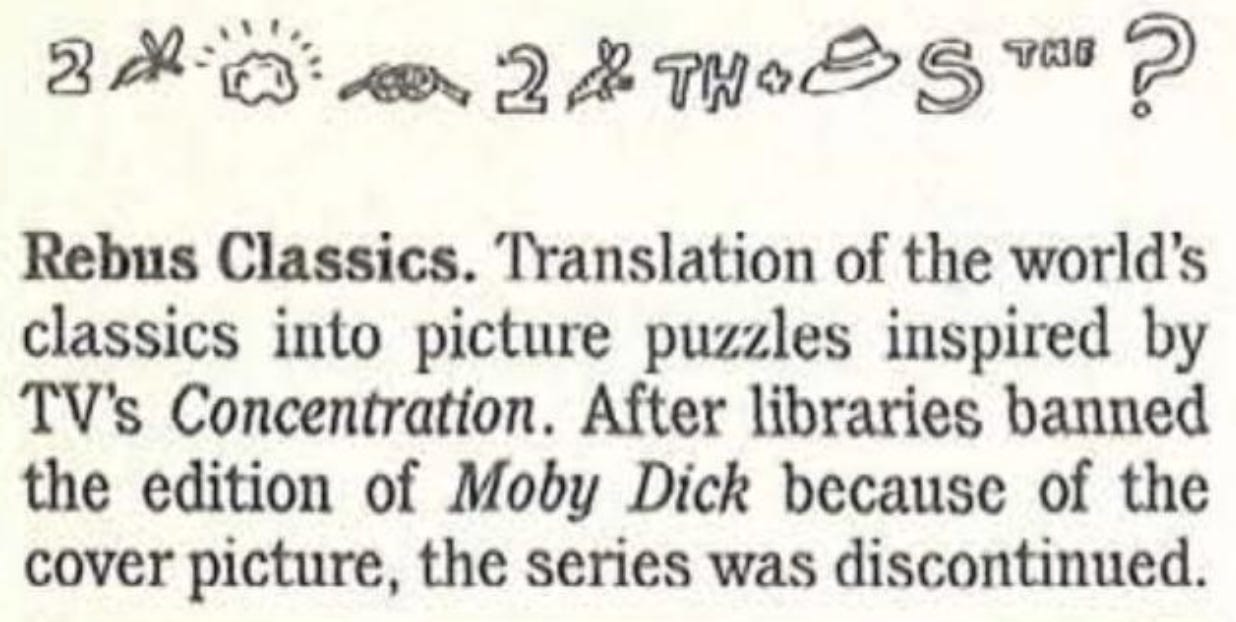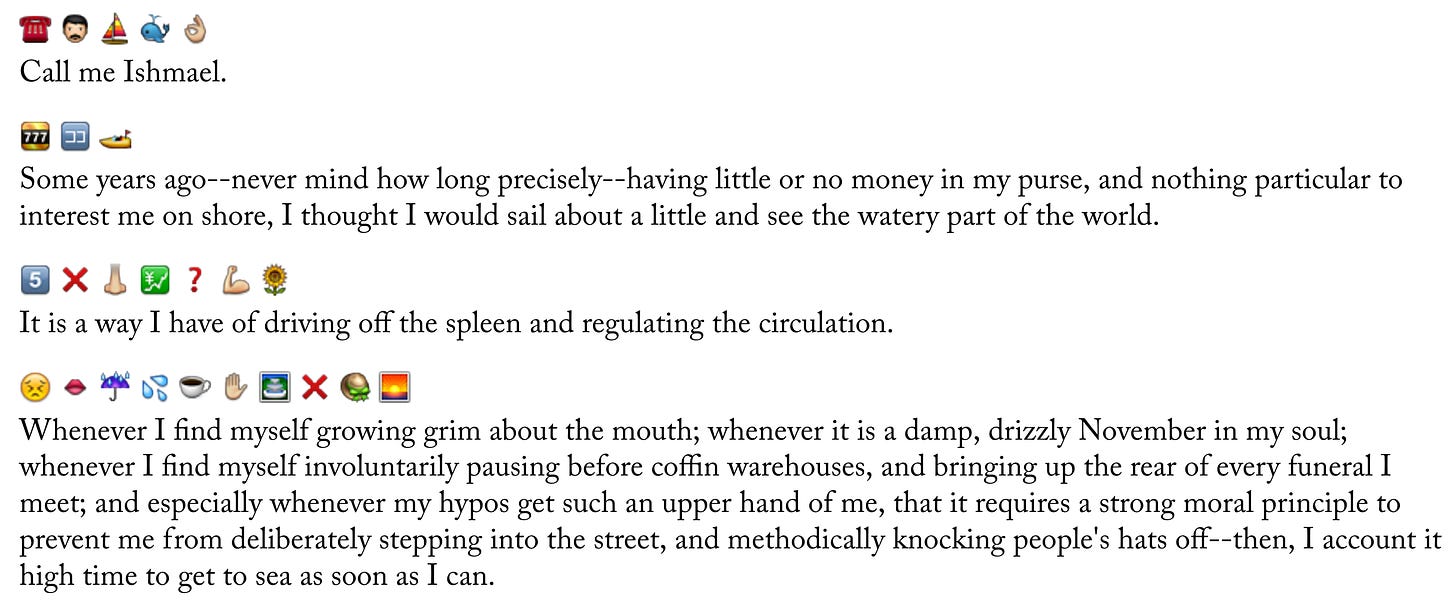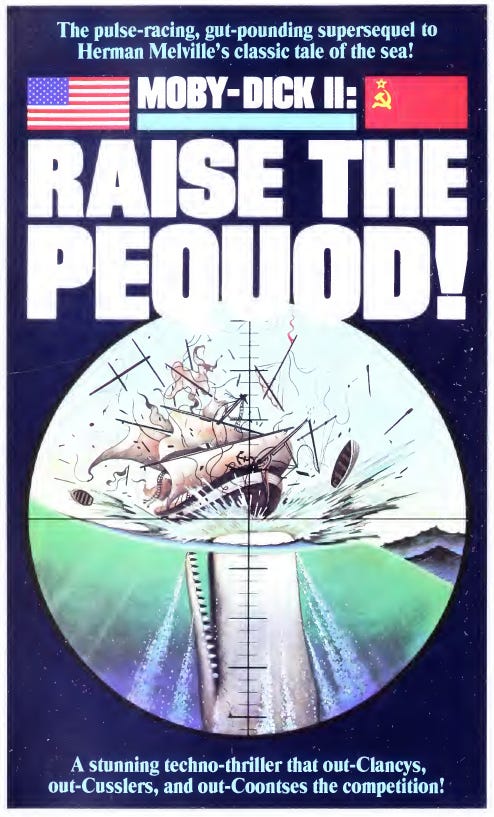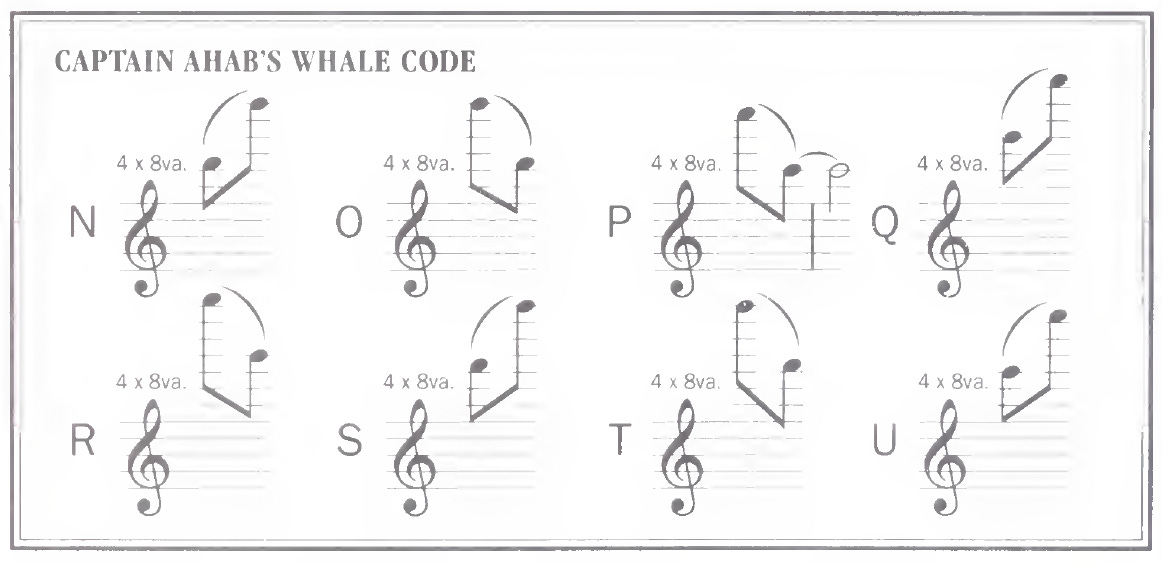EXTRACTS: National Lampoon's Moby-Mania
; or, the joke that never ends
While I was looking into the National Lampoon Radio Hour musical Moby!, I found that the Brian McConnachie and Sean Kelly’s obsession with Moby-Dick and whales in general went far beyond their mini-musical, spilling into the Lampoon’s pages and albums for years to come. More than a few of them, I found, were even strangely prophetic.
Songs of the Humpback Whale
Each issue of the National Lampoon magazine had a loose theme to its content, and in January 1974 its target was a group that really needed to be put in its place: Animals. From a wordy legal treatise on the law of the jungle (including § Freedom to Cry, Howl, Bay, and Hoot; § The Right to Bare Claws; and § The Right to a Speedy Trial By Jury) to a few sample pages from “Pethouse Magazine,” no creature was safe.
Among the send-ups was a concept from “Moby!” writers Sean Kelly and Brian McConnachie called “The Humpback Whale Official Songbook.” Presented as 1930s sheet music, the songbook is said to be “as performed in concert by ‘Big Mammal’ Thornton,’ Ivory Jonah Hunter, Gerry Lee ‘Killer’ Whale, and Alice Plankton.”
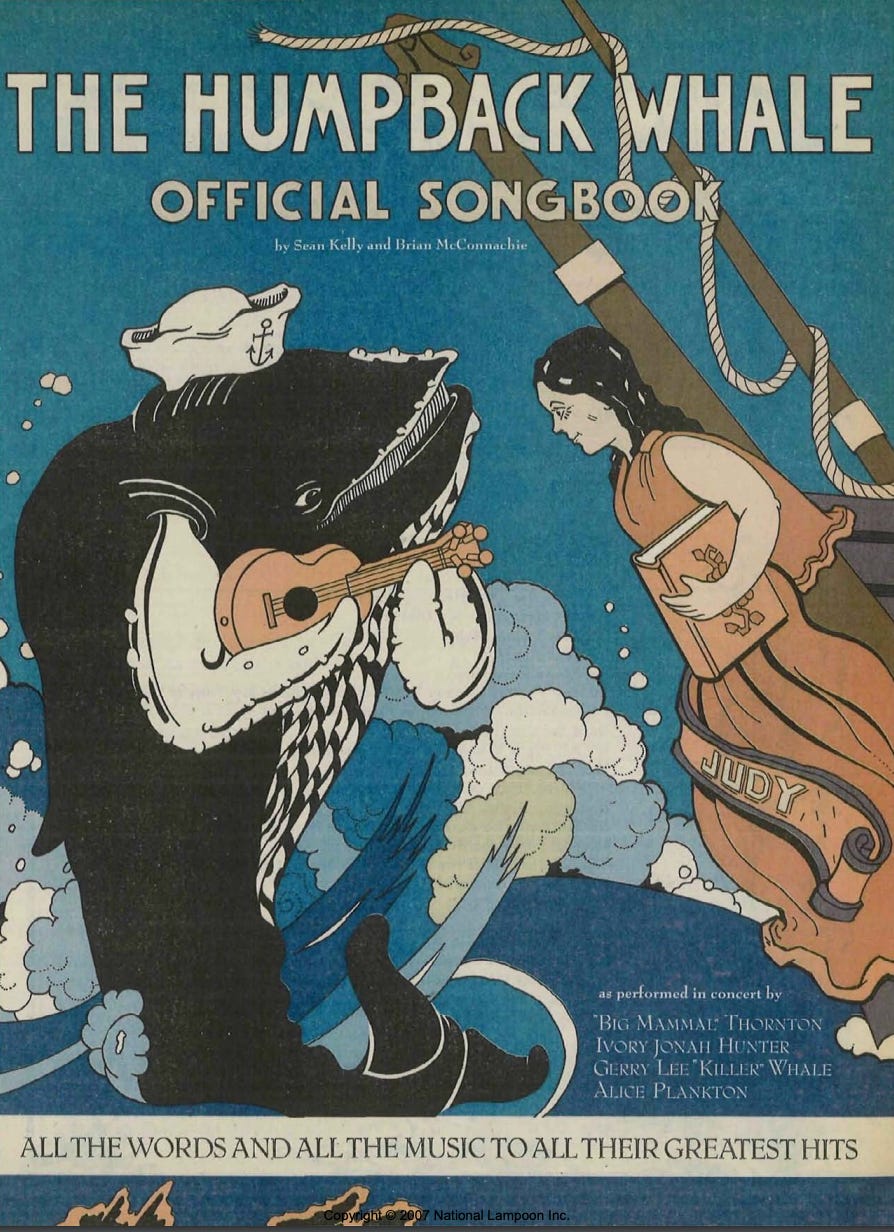
The songbook’s table of contents lists 27 songs in the humpback whale’s repertoire, from the contemporary music-referencing “Submarinian Seasick Blue,” “It Ain’t Heavy, It’s My Blubber,” and “I’d Rather Beach a Grampus than a Whale,” to the unforgivably punny like “I’ve Been Fluking on the Whaleroad,” “My Finny Valentine,” and “Porgy and Bass.”
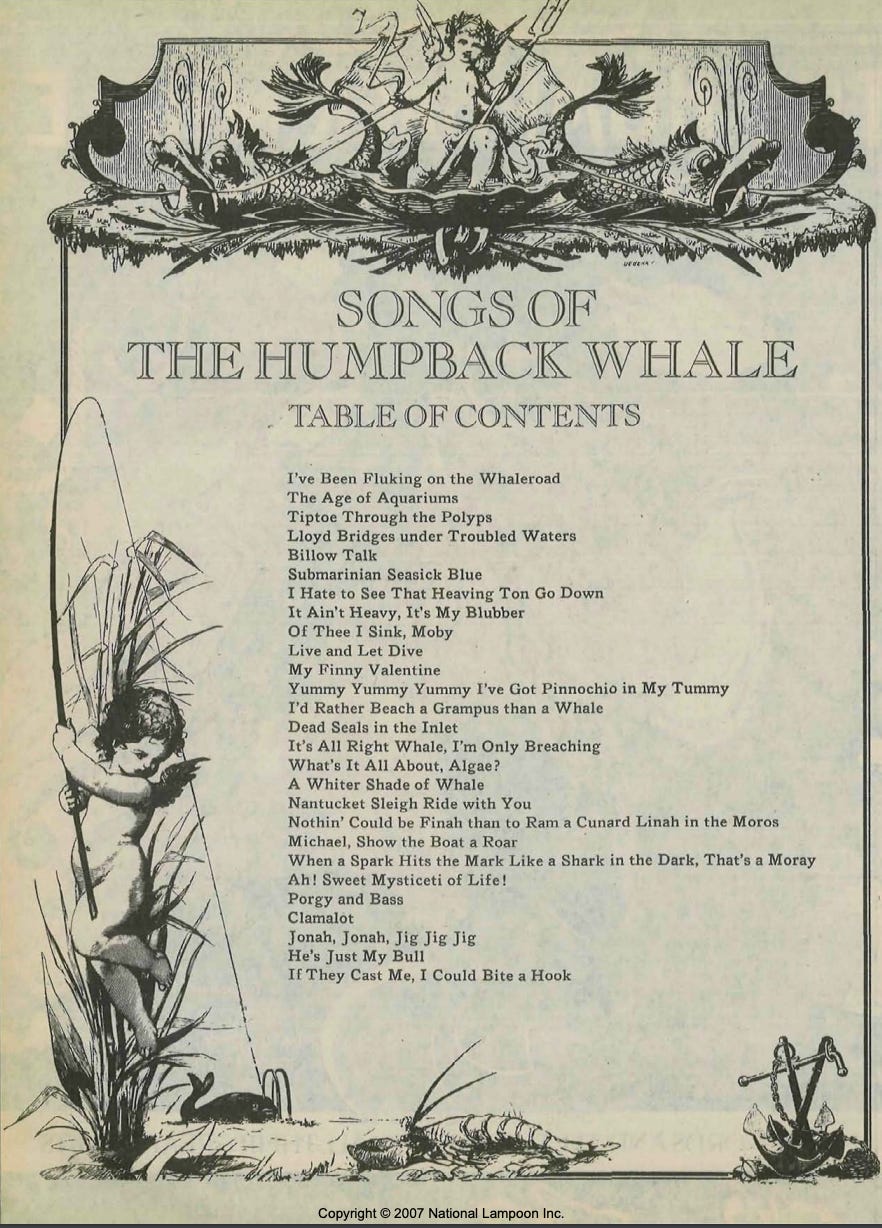
In truth, though, the songbook contained lyrics for just two songs: “I’ll Take You Home Again, Baleen,” possibly sung to the tune of the schmaltzy 1973 Elvis Presley song; and “I Am Whale,” likely a reference to Helen Reddy’s 1972 hit “I Am Woman.” Neither of the lyrics seem to match the pattern of those songs though, so let me know if you have any better guesses!
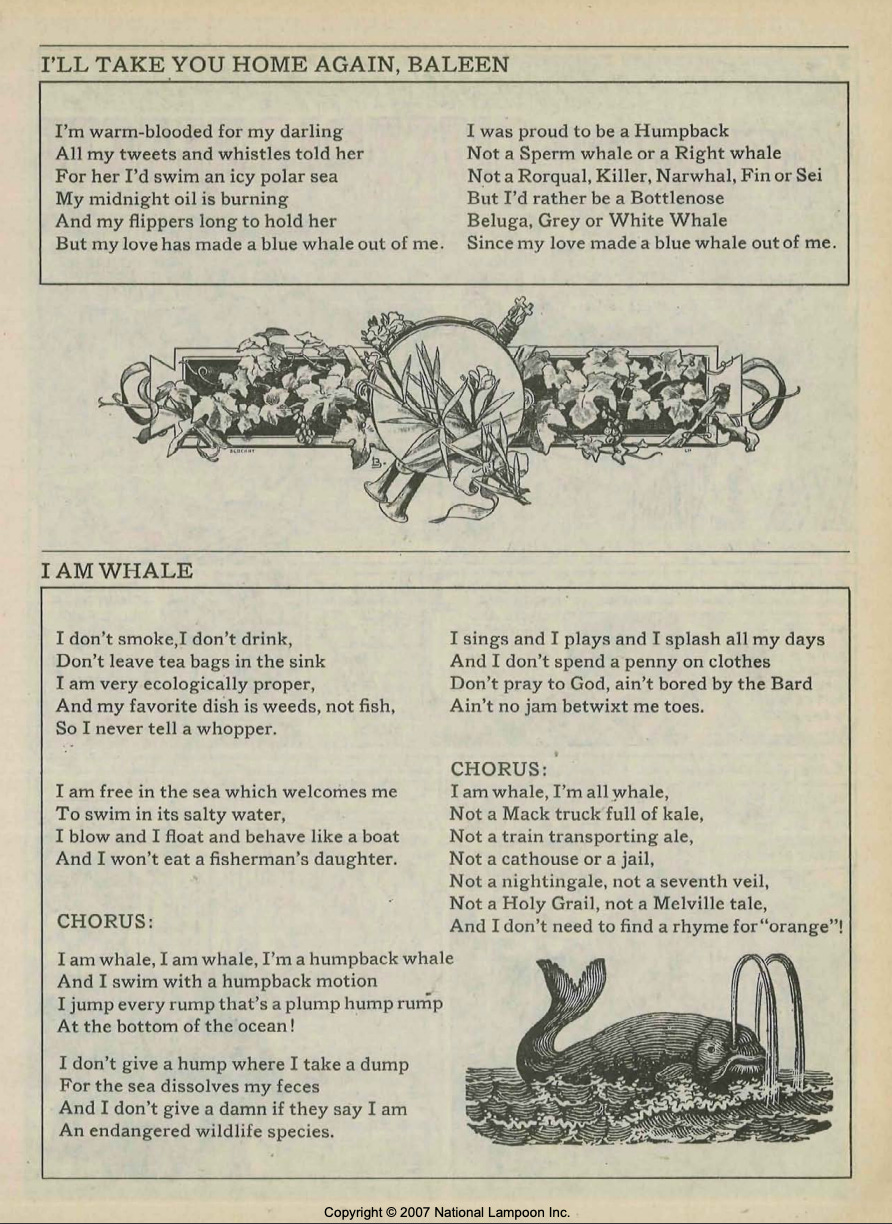
So what did humpback whales ever do to deserve such treatment? Well, it was nothing new to them, per se, but the question of what they were singing down there was actually more topical than you might imagine. It was only a few years earlier that marine biologist Roger Payne came across declassified recordings made by U.S. Navy engineer Frank Watlington, listening for Russian submarines off the coast of Bermuda. The recordings, made in the late 1950s, had captured hours of humpback whale noises from “high wails to deep growls to rhythmic scratches to tearful moans.”
Along with his wife Katharine, who had studied both biology and music in school, Payne analyzed the tracks as visual frequency spectrograms, finding that the vocalizations repeated themselves in defined patterns and structures. They also changed subtly from year to year, with entire populations adapting their vocalizations in unison. They were, the Paynes declared, the whales’ songs.
During their research, the Paynes paid a visit to Watlington in Bermuda and made even more recordings using underwater microphones."I had never heard anything like it," Katharine later recalled. "Oh, my God, tears flowed from our cheeks. We were just completely transfixed and amazed because the sounds are so beautiful, so powerful — so variable. They were, as we learned later, the sounds of just one animal. Just one animal." The Paynes sensed an opportunity to raise awareness of whale intelligence and spur conservation efforts, releasing the songs as an album titled “Songs of the Humpback Whale” in August 1970, including a 48-page booklet with information about the modern whaling and declining whale populations around the world.
The response was — and this is coming from someone obsessed with a book about a whale — kind of insane. The album quickly sold through its initial 125,000 copies and eventually went multi-platinum, becoming the most popular nature recording in history. Folk singer Pete Seeger personally paid for a lecture tour about the songs across Russia, presumably directed at their continued commercial whaling sector. The New York Philharmonic performed a humpback-inspired “Concerto for Whale and Orchestra,” and songs from the album were sampled by Judy Collins and Kate Bush. In 1979, a clip from the album on was included as a flexi disc insert in an issue of National Geographic, sent out to the magazine’s 10.5 million subscribers, making it the largest single pressing in recording history – a record it holds to this day.
And then the record really went through the stratosphere. Literally. In 1977, a clip from the album was included on NASA’s “Golden Record” launched into space aboard the Voyager spacecraft along with music from Bach, Mozart, and Louis Armstrong. Those whales are now singing more than 15 billion miles from Earth as of April 2025. And just when you thought they couldn’t live any longer or prosper any harder, the album inspired a 1986 Star Trek movie in which Spock and crew travel back in time to communicate with humpback whales before they went extinct.
All this to say that the album was more than a little ripe for gentle ribbing from Kelly and McConnachie, who take the idea of whale songs to its logical extreme. If the aliens ever discover the Voyager record, let’s hope that the whale’s were singing something a little more profound than “Yummy Yummy Yummy I’ve Got Pinocchio in my Tummy.”
Whaling songs — the next big thing!
Just two months after the Moby! musical episode aired on Radio Hour in September 1974, Sean Kelly was back with even more whales and whaling content, and it’s a wonder that his colleagues didn’t send him directly to a psychiatric ward.
Leading off Episode #52 on November 9, 1974 was a faux radio segment in which Bill Murray plays the laid-back FM deejay Mel Brewer interviewing A&R man Ron Fields, played by Christopher Guest. Fields, who speaks in a seriously unhinged Long Island accent, has an inside tip for the next trend in music: whaling songs.
MEL BREWER: And what kind of stuff are they gonna be doing? Are they rockers? Are they country music? They playing classical rock or… ?
RON FIELDS: Excuse me? Whaling songs. The best. That’s what they do. They sing whaling songs. No instruments. No guitar. No bass. No drums. No Moog. Nothing. Dumper. In the dumper those instruments. Flush them down the toilet.
MB: They just sing? They’re a capella then?
RF: A cappella. A cappella. A cappella. They’re fantastic. Found them in the Shetland Islands. They’re terrific. They’re the best. Whaling songs are gonna be the new trend. No more country music. No more classical music. Forget it. Forget it. Forget it. I don’t remember what that was. It went out the window. I don’t remember it. No more classical music here at the station . Only whaling music. It’ll be fantastic. No more country. No more rock and roll, thank you. […]
MB: Who do you think in particular they’re going to appeal to?
RF: Everybody. Everybody. Everybody. A fireman. A neurosurgeon. The guy on the street. The bum on the corner. The cop on the beach. The guy with varicose veins. The guy in traction. Anybody. An old lady with a walker, crying, husband’s left, goodbye, not coming back. I’m talking anybody. I’m talking a choir. I’m talking Gump Worsley. I’m talking dejected. I’m talking rejected. I’m talking no contract next year. Seventy-five grand one year. No money the next. I’m talking anyone who’s interested in listening to whaling songs. Whaling songs are the best. I’m talking about a guy in Africa. In a gumbo hut. I’m talking about a guy in the bayou. I’m talking about a guy in Florida suntanning his nose.
Unlike many of the bait-and-switch jokes the Radio Hour was so fond of, the track is exactly as described. And not only is it a good ersatz-19th century sea shanty, it hews so close to the real thing that I spent a good amount of time making sure it wasn’t a real song. And I’m still not 100% sure.
Out of New Bedford, twenty-one years on the good ship Columbine (Hey)
For the sea below's green in the Argentine when the bosun supplies the line (Hey)
Oh, around the Horn our whaler attacks with a crew of Bedford men (Hey)
McGee and me and the first mate's three and dirty Boston Ben
Oh, it's all hands tug and blow, lads, blow
When you hunt for the horrible sperm
Oh, it's up me mates as the lookout shouts and the topsail mizzen’s fast (Hey)
And the captain spins on the forecastle poop as we sighted whale at last (Hey)
Let us breach our boats in the ocean wave while the oarlocks whistle and boom (Hey)
And Indian Joe in the spit of the bow let's fly with his lampoon
Oh, it's all hands tug and blow, lads, blow
When you hunt for the horrible sperm
And the whale she dives like a devil into hell and away goes the singing line (Hey)
And Boston Ben took a flounder off the flukes and he drowned in the salty brine (Brave lad)
And he drowned in the salty brine (Brave)
Now there's one less oil fish in the sea and the good ship’s safe and sound (Hey)
And the oil's on to boil in the belly of the hold and we're bound for Bedford town (Hey)
Oh, it's all hands tug and blow, lads, blow
When you hunt for the horrible sperm
As it turns out, Ron Fields wasn’t wrong — just way ahead of his time. Let us not forget the (mercifully brief) sea shanty revival during the COVID-19 lockdown, where people took off their N95 masks to sing The Wellerman in four-part harmony. Like the man said, I’m talkin’ seventy-five grand one year, no money the next.
Sick Humpback Whales
One of the dumber achievements on National Lampoon’s 1977 album That’s Not Funny, That’s Sick, is a track simply titled “Humpback Whales.” The group was clearly not done laughing at the unexpected success of Payne’s “Songs of the Humpback Whale” album, and had to throw in one more barb.
The track, not unlike those Masterpiece Theater spoofs, begins with Tony Hendra’s serious National Geographic-style monologue over hypnotizing synthesizer.
HENDRA: The humpback whale. Master of the deep. Tireless voyager. Perhaps the most fascinating mammal in creation. Tests have shown the humpback to possess an intelligence almost human in its range and complexity. Humpbacks can communicate with one another. Express pain and pleasure. And experience emotion. But, with these advanced faculties come problems. This highly sophisticated, made in the humpback’s favorite feeding grounds off Baja, California, reveals that the enormous animals, may even share with its predator, man, some of those tragic physical disabilities the flesh is heir to.
The rest of the track is — and I won’t beat around the bush here — long, melodious whale farts (or worse), no doubt aimed directly at Payne’s album. Hendra returns with a serious plea: “Please send a contribution to Save the Whales, before they blast themselves into extinction.” The writers thought the joke was so good that they made it part of their 1977 tour of new material.
But before we get all haughty, let’s not pretend like Melville didn’t sneak a few fart jokes into Moby-Dick, nor forget the rotting, ‘dyspeptic’ dead whale in Chapter 91 and the disgusting efforts to retrieve ambergris from its backside. If there’s one unequivocal takeaway from the book, it’s that whales are kind of gross.
Rebus Classics
For National Lampoon’s February 1986 issue — it’s so-called “Big Money and Other Sexy Subjects” issue — writers Will Jacobs and Gerard Jones put together a gag list of Great American Failures, collecting ideas for terrible inventions like shoe umbrellas, canned eggs, and water shoes (“like a waterbed for your feet”).
Among the failures was an idea for Rebus Classics, “Translations of the world’s classics into picture puzzles.” The series’ downfall, so it says, was the cover image for its edition of Moby-Dick.
Two decades later, Fred Benenson and 800 of his closest friends (i.e., cheap crowdsourced labor from Amazon’s Mechanical Turk program) delivered on the joke’s premise, producing a complete sentence-by-sentence translation of Moby-Dick into emoji. The result was published as Emoji Dick in 2010, the result of over 1,000 collective hours of some real lateral thinking to turn the book’s languages into abstract images.
Admittedly, none of it is remotely comprehensible without the side-by-side text, and much of it is incomprehensible even with the text. But would you really want to live in a world without Emoji Dick?
Moby Dick II: The Sequel
In 1990, former Lampoon writers Henry Beard, Christopher Cerf, Sarah Durkee, and Sean Kelly collaborated on the instant classic bathroom read The Book of Sequels, billed as “remakes, updates, and spin-offs of the world’s best-loved masterpieces” like “Solitude: The Next One Hundred Years,” “The Egyptian Flip Book of the Dead,” “I Was a Teenage Beowolf,” and “Everything You Wanted to Know About Sacks (But Were So Aphasic You Forgot to Ask).”
Among these brilliant sequels was “Moby-Dick II: Raise the Pequod!,” a Tom Clancy Cold War spoof which imagines one of Ishmael’s descendants (also named Ishmael) as a biologist and the “world’s leading expert on communication with marine mammals.” (Sean Kelly, who I have no doubt was behind this parody, really had it out for the idea of chatty whales).
When the U.S. Navy comes calling, Ishmael explains that his great-great-great-great-grandfather had narrated his true story to Herman Melville, who was merely his scribe. Melville had refused to include a chapter about Ahab’s special ability to understand whale language in order to hunt them so as not to undermine the credibility of the book. As luck would have it, Ishmael Jr. Jr. has the coffin buoy that saved his ancestor, and in it found a piece of Ahab’s shattered leg from Chapter 108 which contained part of Ahab’s secret whale code. The remainder of the code must still be on the ship, they all agree, and they decide to raise the Pequod.
The story is 30 pages long so I won’t get too deep into it, but suffice it to say that everyone’s distant descendants keep showing up until the Pequod rescue mission is being conducted by Captain Starbuck, Lt. Commander Pete Stubb, Queequeg, and Queequeg’s daughter, Sheequeg. Even the actual Moby Dick appears, introduced with a deep cut reference explaining his presence.
"Good Lord, it's Moby-Dick!" cried Ishmael. "The speculations of the whalemen in Chapter 41 of Melville's book were correct—he is immortal!"
Twenty years later, Barry Bostwick starred as Ahab in “Moby Dick: 2010” about the USS Pequod listening for enemy submarines in Soviet waters. There’s an enormous whale, a cast list made up of Queequeg, Starbuck, Captain John "Boomer" Enderby, and even Bulkington and Doughboy. Sean Kelly, once again, proved himself a Fedallah.
The Book of Sequels: The Sequel
The Book of Sequels actually contained not one but two mentions of Moby-Dick, the other being a fake advertisement from the Yiddish-American Heritage Society selling a collection called “The Library of Yiddish Sequels.” Titles in the series include Moyl Flanders, Jonathan Livingston Siegal, The Brothers Karamazeltov, The Catcher on Rye, and Mensch of the La Mancha. The writers loved a good literary pun.
The pitch begins with an intriguing question:
Do you remember the moment you opened Moby-Dick for the first time? Within moments you were swept away by the awesome power of Melville's narrative, enthralled by his meticulous descriptions of nineteenth-century maritime life, and deeply moved by his evocative portraits of Ishmael, Ahab, and of course, Moby himself. But, truthfully now—wouldn't you have enjoyed the book even more if the whale had been Jewish?
After all, the only substantive mention of Jews in Moby-Dick comes in this regrettable reference to medieval anti-semitism, part of Chapter 92: Ambergris.
The truth is, that living or dead, if but decently treated, whales as a species are by no means creatures of ill odor; nor can whalemen be recognised, as the people of the middle ages affected to detect a Jew in the company, by the nose.
The name “Moby,” as I discussed in a recent post, may well have come from mob, meaning “to wrap in a cowl or veil” per Ben Rogers’ argument. Adding a ‘y’ thus gives gives us Moby, or “having the qualities of being hooded, especially about the head.” And the whale is referred to in the first chapter as a “grand hooded phantom,” in which case… aren’t we just talking about a giant yarmulke?
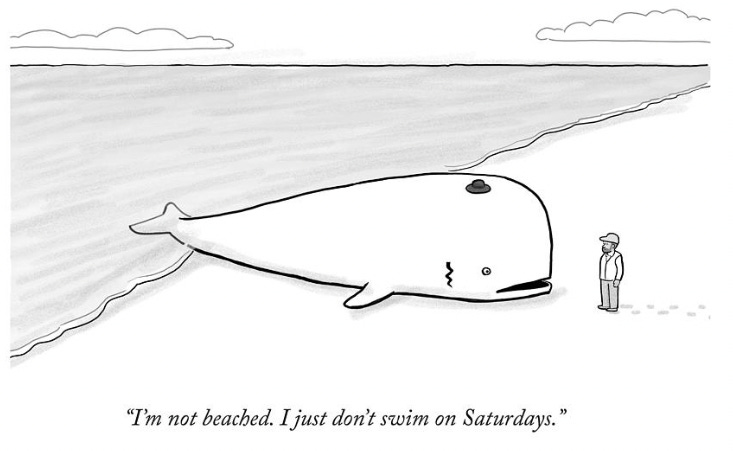
The Pequod Meets the Delilah
Finally, and presented out of order chronologically, is an entirely new and racy chapter to insert into your copy of Moby-Dick, published in the National Lampoon Magazine back in August 1976. The spoof had been inspired by novels by Spiro Agnew, William F. Buckley, and John Lindsay, each of whom had stated during talk show appearances that their new books included an “obligatory sex scene.” The idea was low-hanging fruit for the perpetually vulgar magazine, which soon after published “obligatory sex scenes” for everything from Pride and Prejudice, Sherlock Holmes, Plato’s Republic, Walden, and, obviously, Moby-Dick.
The supposed lost passage is titled “Chapter 101: The Pequod Meets the Delilah” and is not for the faint of heart. It’s also clearly riffing on Chapter 100: Leg and Arm in which the Pequod meets the Samuel Enderby. Captain Boomer becomes Captain Bammer, and certain lines are lifted almost word for word, like the comical introduction between Ahab and Dr. Bunger (“by the way, captain—Dr. Bunger, ship’s surgeon: Bunger, my lad,—the captain”). In other words, it could not have been written by anyone not fully obsessed with the book.
I’ll warn again that the story is bawdy, to say the least, but it does stay surprisingly true to the style and characters in a way that most Moby-Dick parodies do not. And while the article doesn’t credit specific authors to each of the parodies, you won’t be surprised to find Sean Kelly’s name among the eight listed in the issue’s table of contents. I know I’d bet a doubloon on him having a hand in it.
So, after the break, here’s a new chapter to insert into your copy of the book, Chapter 101: The Pequod Meets the Delilah.
“Ship ahoy! Hast seen the White Whale?
So did Ahab cry his peremptory greeting to the snug three-master that bobbed in languid placidity abaft our port beam. She sported British colors and appeared to be a ship unlike the whaling variety as constructed by either English shipbuilders or those of America, but rather seemed laden with a tamer cargo, be it textile or jute or breadfruit. Likely she was accustomed to milder climes and glassier waters, such as those we now mutually sailed. But the Delilah’s—for that was her name—pleasure was proving Ahab’s curse.
“Ahoy, ship!” cried the Pequod’s commander. “Hast seen Moby Dick? Or do ye not know of the beast?”
“Aye, sir!” called the Delilah’s captain, a red-faced, swart man clad in rough bluecloth and jovial in expression. “Lower me, lads, and I’ll pay this Pequod a visit.” To Ahab he called in a conspiratorial tone, “I’ve a yarn to spin for ye, sir. So make ready yer welcome. Will you have me aboard?
“I will,” replied Ahab, his leathery hands working a belaying pin as a constable manipulates his billystick. “Lower, then, and be welcome.”
The captain and mate of the Delilah were presently lifted aboard and met on the main deck by Ahab, accompanied by the mate Starbuck and the jocular Stubb. During this the crews of the two ships would peer across the narrow gulf that stretched between the vessels and exchange intelligence. as is a seaman's wont. "Halloo, there! Delilah! Where are ye bound, and with what cargo?"
"Ahoy, Pequod! To San Salvador, with caskets of rosewater, and talc! And what of yourself?”
"Outward bound, and in search of the white whale! No less!"
"What! Are ye daft, then, my laddies?"
"Avast! Avast, and shove it!"
Meanwhile Captain Bammer. for so was the Delilah's commander called, complimented Ahab on his vessel, and the two men exchanged discussion of climatic conditions and the mood and manner of the adjacent seas. But Ahab was greatly impatient for word of his quarry, and soon could restrain himself no longer. "Come, sir, what word have ye of the White Whale? You've a yarn to spin, ye tell me. Spin it, I say, for I am sore eager to lower for the beast and have at it."
"Mayhap you've already met the monster a time previous, hey, Captain?" Bammer asked, his eye studying Ahab's leg of white bone. "We of Britain are as familiar as any Yankee with the proclivity of this leviathan to gnaw the limb of whoever happens—”
"Proclivity be damned, sir!" spat Ahab. "Have ye a tale to tell, or no?"
"My apologies, sir." And here Bammer did smile, but whether to placate the temperamental Ahab, or at some private recollection, no man could say. "For a tale I do have to tell, sir, and by your leave will now reveal it.
"It was nigh onto a year ago that I was homeward sailing from a ten-month mission in search of the spermaceti, and a blessed voyage it had been, gentlemen; for we were loaded to the mizzen with good sperm. We had a clean wind, a happy crew, and the promise of prosperity awaited us in Portsmouth, come landfall. All omens declared the success of the venture—"
"Avast!" Ahab cried. "And 'twas then you spied the beast, is it? Aha, yes! I know him—and in the prettiest of weather, does he arrive to torment and—"
"Bless me, sir, no!" Bammer laughed. "Never saw the creature. For we reached our port with three days to spare, without mishap. No, sir, neither shark nor storm, nor any whale, white or red or green, did disturb our progress. My point is this, then: two days we were docked in Portsmouth harbor. The lads were nearly all in town, visiting wives or sweethearts or making merry over meat and ale ... and my mate, Mr. Sprocket--pardon, Sprocket, Captain Ahab, Captain, Sprocket--Mr. Sprocket here suggests that I hie myself ashore and celebrate with my own wife.
"'Well, Sprocket,' says I, ‘I'd take yer advice, saving for the fact that the wife is dead and buried for three years. And a pretty lass she was in her time, by God.’”
“‘Well then, sir,' he says, bold as brass, 'every seaman knows what dalliances can be had in Portsmouth by a healthy sailor with a bit of silver in his pocket...' and he winks at me, Sprocket you rascal! Ah, Sprocket, you are a rogue."
"Hist, man!" Ahab interrupted impetuously. "What of the whale What of Moby Dick?"
"In time, sir, in time. So. It strikes me that this first mate's suggestion is as tantalizing as it is impudent, and with Sprocket minding the ship I betakes myself for a constitutional along one of several byways through the city that boasts various ... establishments, if you comprehend me, gents."
"Aye, and too plainly, sir. For there's no good in such dalliances, if you ask me," Starbuck opined.
"But more, sir," Stubb urged. "And pray be specific." Again Bammer laughed, apparently oblivious to Ahab's silent fury and frustration. You've an ear for detail, is it? Very well, then. I betook me to an establishment called The Cask o' Sperm, and can ye not tell by the place's very name how welcome a whaling man is made to feel therein? And after certain... arrangements... I found myself in a nicely appointed room, all frills and lace and satin divans, don't ye know, and a comely lass barely eighteen summers old ready to do my bidding. A gay young thing she was, too, and sporting—"
"The teats!" Stubb cried, unmindful of the man's rank. "Tell of the teats!"
"Ay, lad! 'Teats there were, and a full complement of them, two in all. Hefty as casabas from the Carribbee they were, full round and.—"
"Damn your eyes!" Ahab bellowed. "Did ye or did ye not see the White Whale?"
"Have patience, Captain, for I tell of the beast in but a moment. So, gents: here was I, ten months from the sight of woman, and now before me kneeled this angel of mercy. "Shall I disrobe, my dear,' say I. 'If you please, your honor,' she replies, And does so as well."
"The flukes!" Stubb panted, meaning by this the legs. "What of her flukes?!"
"Twin monuments to alabaster purity, my lads. And at the sight of one another did we commence into heavily respiring, and each ardent caress I gave her she returned—aye, and with more fervor than you'd expect from one so professionally engaged!"
"What of Moby Dick?" wailed Ahab, near apoplexy.
"And then we were on her couch," Bammer continued, not heeding the Captain. "And as I made to ram home the harpoon, she balked and said, 'A moment please, your honor,' and in a trice the damsel had taken me into her mouth!"
"Huzzah! Huzzah!" cheered Stubb, and slapped the dubious Starbuck on the back. "And then you lowered away, my hearty!
You lowered away!"
"What of the whale, damn ye!"
"Nay, but hold, lads. I was preparing to lower away, but my pike was still gripped by the girl's jaws, when all on a sudden I clap eyes on her marvelous rump. And idly--idly, I say, to myself it was—I murmur, 'Ah, my dear, but ye are as white as the White Whale himself, as white as Moby Dick, who every sensible seaman does fear.' And suddenly she starts! And gags! And gurgles! And in a jiff had bitten clean clear through my pin and clove it in twain!"*
"No!" gasped Stubb, and nearly swooned, holding onto stolid Starbuck's arm for support.
"Aye, lad. And when the shouting and bleeding and the apologies were subsided, did she explain to me that her own uncle was an American whaling captain who some time previous had lost a limb to the maw of the leviathan, and any mention of the whale disturbed her to the point of spasms and fever. Her uncle! Are ye this same man, sir?" This last he addressed to our captain, who merely stared at the man with a blank gaze and nodded slowly.
"Then behold this bony substitute for as stout an organ as ever traveled a deck." Bammer said, and produced from his trousers an ivory appendage fashioned of whalebone similar to Ahab's leg. "For no longer can I sail for whale oil and the sperm, gents. My vital powers are sapped, and I now deliver cargoes of scented water, and talc, and the like. I am not ashamed of my fate, mind you. But to whosoever does finally kill this white monster, let him know I join in his pursuit. More than one captain has he done injury to, this Moby Dick!"
And with that Bammer hoisted himself down into his boat, and made his way back to the Delilah. Ahab, his monomania again kindled and stoked, scowled, and disappeared below decks.


